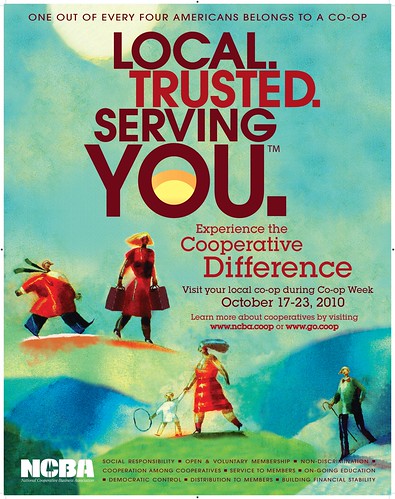
Cooperatives are born out of community need. They are founded on the ideals of social responsibility and self-help. For that reason, it seems most fitting that the seventh of the cooperative principles is “concern for community.” Members of the National Cooperative Business Association—and cooperatives around the world—subscribe to all seven cooperative principles.
What does “concern for community” mean? Well, in its definition of the principle, the International Cooperative Alliance states that “cooperatives work for the sustainable development of their communities through policies approved by their members.”
For me, the most important concept in the seventh principle is the idea that the support provided to the community will lead to sustainable development. It’s the difference between teaching someone to fish and giving them a fish. The skill lasts longer and is more empowering than the item alone.
How an individual cooperative will fulfill the seventh principle depends on the needs of the community and the interests of the co-op’s members. Below are some of the ways that NCBA members and other cooperatives demonstrate concern for community. This is by no means a comprehensive list as in the United States alone 29,000 cooperatives operate in all industries!
- In New Orleans, just last week, Cabot Creamery set a Guinness Book of World Records for the “biggest Mac & Cheese.” The event was a fundraiser to benefit the New Orleans Area Habitat for Humanity, which continues to empower families to transform their own lives.
- Credit unions around the country offer their members “payday loan” services, which are low-cost alternatives to the fees charged by for-profit payday lenders. North Carolina State Employees Credit Union takes it a step further by adding a savings component, which is key to breaking the payday lending cycle.
- Wright-Hennepin Cooperative Electric Association is empowering its consumer members to reduce their electricity use with its “MyMeter” program. This program gives Wright-Hennepin members detailed information about energy consumption, allows them to compare their use with that of their neighborhood and enables them to set conservation goals.
- H.O.M.E, Inc. started in 1970 as a craft cooperative. Now, it operates as a multi-faceted, service-oriented, intentional community that offers jobs, food, education, temporary shelter and home ownership to people and families in need. H.O.M.E’s services intend to develop stability and foster self-esteem within their community.
Cooperatives make the world a better place by focusing on creating sustainable, long-term community benefits. The United Nations has proclaimed the year 2012 the International Year of Cooperatives in order to recognize the power of cooperatives to promote economic and social development and their work in eradicating poverty.
The United States is joining countries around the world to celebrate the benefits cooperatives deliver to the communities in which they operate. I hope you’ll become part of the celebration by joining or patronizing a cooperative in your community this month. To find out more about cooperatives and to see a list of co-ops in your area, visit the Go.Coop website. Happy Co-op Month!
Note: Agriculture Secretary Tom Vilsack has issued a proclamation designating October as National Cooperative Month and President Obama has written a letter. Also, USDA Under Secretary for Rural Development Dallas Tonsager today announced funding to support cooperative development activities. You can read the news release here. To find out more about USDA’s cooperative programs, click here.



